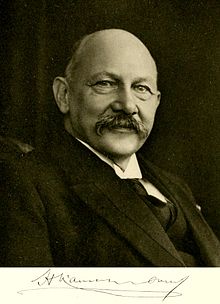Kammerlingh Onnes
| Heike Kamerlingh Onnes | |
|---|---|
 |
|
| Born |
Heike Kamerlingh Onnes 21 September 1853 Groningen, Netherlands |
| Died | 21 February 1926 (aged 72) Leiden, Netherlands |
| Nationality | Netherlands |
| Alma mater |
Heidelberg University University of Groningen |
| Known for |
Liquid helium Onnes-effect Superconductivity Virial equation of state Onnes-effect Coining the term “enthalpy” Kamerlingh Onnes Award |
| Awards | Matteucci Medal (1910) Rumford Medal (1912) Nobel Prize in Physics (1913) Franklin Medal (1915) |
| Scientific career | |
| Fields | Physics |
| Institutions |
University of Leiden Delft Polytechnic |
| Doctoral advisor | Rudolf Adriaan Mees |
| Other academic advisors |
Robert Bunsen Gustav Kirchhoff Johannes Bosscha |
| Doctoral students |
Jacob Clay Claude Crommelin Wander de Haas Gilles Holst Johannes Kuenen Remmelt Sissingh Ewoud van Everdingen Jules Verschaffelt Pieter Zeeman |
| Influences | Johannes Diderik van der Waals |
| Influenced |
Willem Hendrik Keesom Cryogenics |
Heike Kamerlingh Onnes (Dutch: [ˈɔnəs]; 21 September 1853 – 21 February 1926) was a Dutch physicist and Nobel laureate. He exploited the Hampson–Linde cycle to investigate how materials behave when cooled to nearly absolute zero and later to liquefy helium for the first time. Kamerlingh Onnes was significantly influenced by the pioneering molecular theory of Johannes Diderik van der Waals. In 1908, he became the winner of the race to make liquid helium and because of this, he was also the discoverer of superconductivity in 1911: for certain materials, electrical resistance abruptly vanishes at very low temperatures.
Kamerlingh Onnes was born in Groningen, Netherlands. His father, Harm Kamerlingh Onnes, was a brickworks owner. His mother was Anna Gerdina Coers of Arnhem.
In 1870, Kamerlingh Onnes attended the University of Groningen. He studied under Robert Bunsen and Gustav Kirchhoff at the University of Heidelberg from 1871 to 1873. Again at Groningen, he obtained his masters in 1878 and a doctorate in 1879. His thesis was "Nieuwe bewijzen voor de aswenteling der aarde" (tr. New proofs of the rotation of the earth). From 1878 to 1882 he was assistant to Johannes Bosscha, the director of the Delft Polytechnic, for whom he substituted as lecturer in 1881 and 1882.
...
Wikipedia
